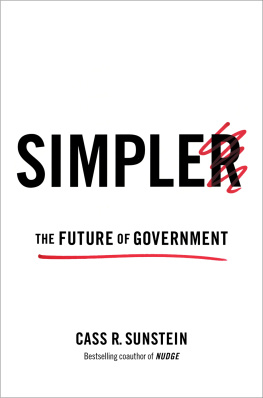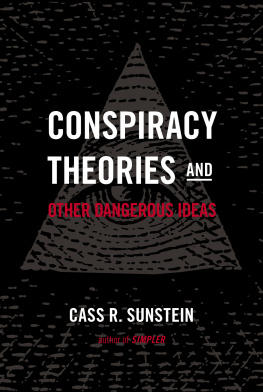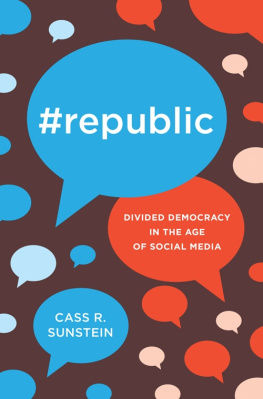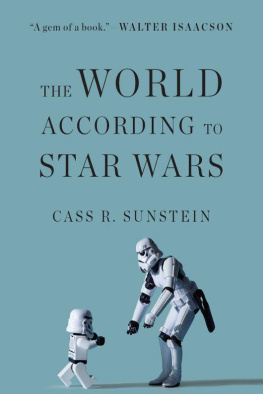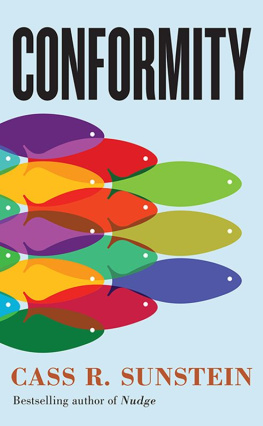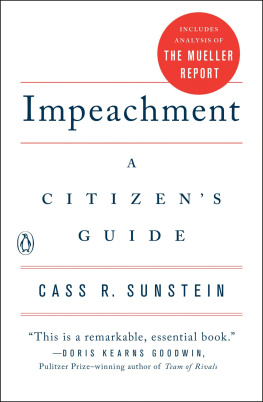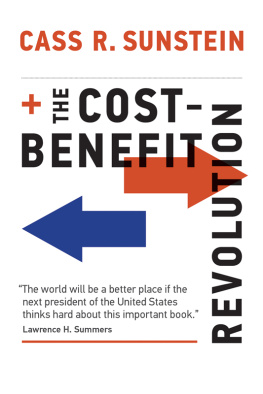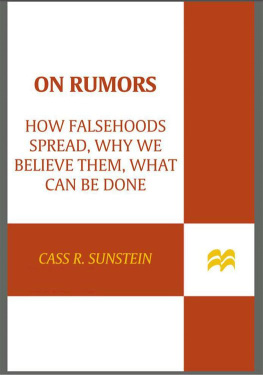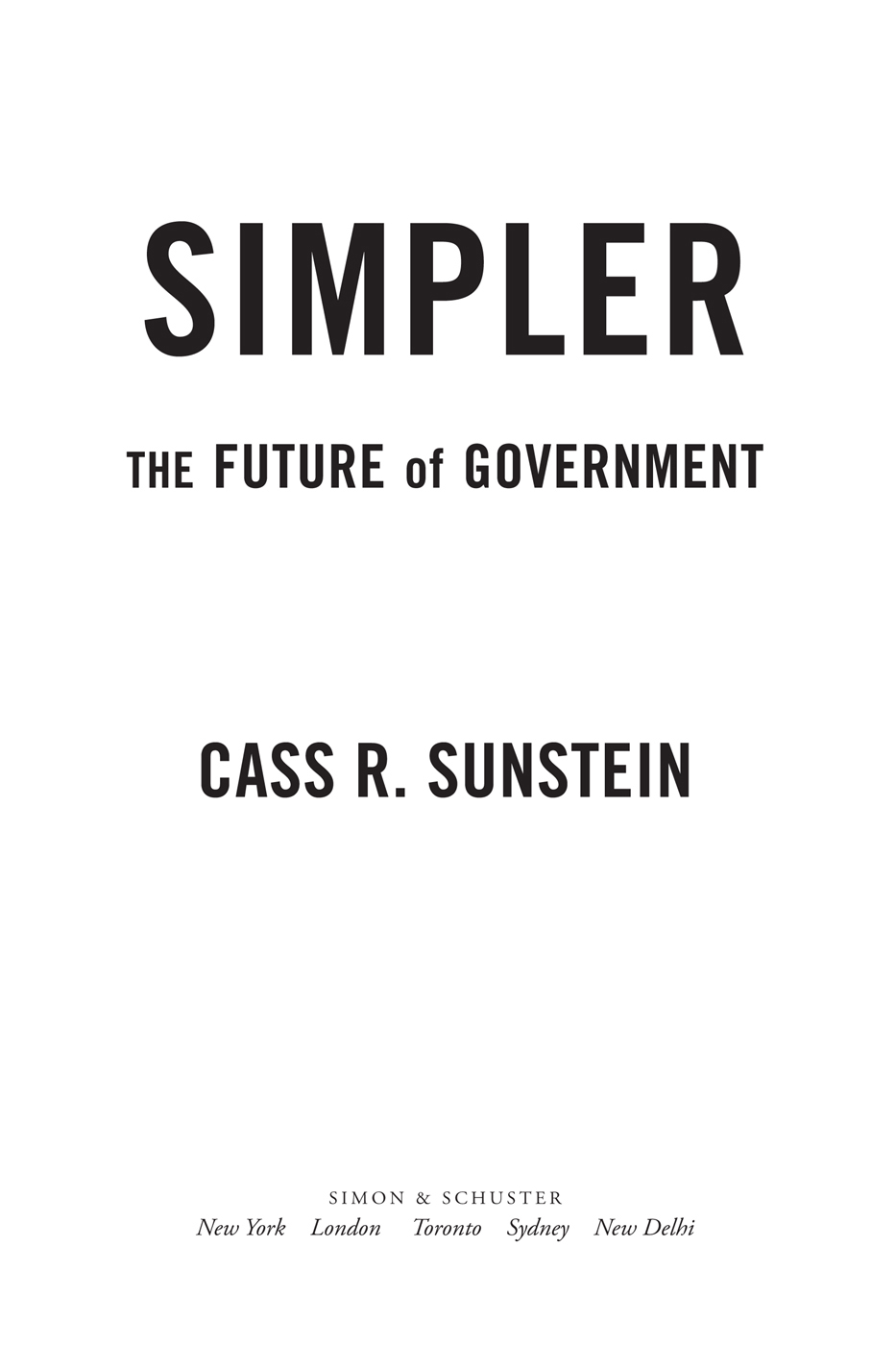Thank you for downloading this Simon & Schuster eBook.
Join our mailing list and get updates on new releases, deals, bonus content and other great books from Simon & Schuster.
C LICK H ERE T O S IGN U P
or visit us online to sign up at
eBookNews.SimonandSchuster.com
We hope you enjoyed reading this Simon & Schuster eBook.
Join our mailing list and get updates on new releases, deals, bonus content and other great books from Simon & Schuster.
C LICK H ERE T O S IGN U P
or visit us online to sign up at
eBookNews.SimonandSchuster.com
Selected Titles by Cass R. Sunstein
Coauthor
Nudge: Improving Decisions About Health, Wealth, and Happiness
Author
After the Rights Revolution: Reconceiving the Regulatory State
Democracy and the Problem of Free Speech
Free Markets and Social Justice
Going to Extremes: How Like Minds Unite and Divide
Infotopia: How Many Minds Produce Knowledge
Legal Reasoning and Political Conflict
On Rumors: How Falsehoods Spread, Why We Believe Them, What Can Be Done
Republic.com 2.0
The Second Bill of Rights: FDRs Unfinished RevolutionAnd Why We Need It More Than Ever
Why Societies Need Dissent

Simon & Schuster
1230 Avenue of the Americas
New York, NY 10020
www.SimonandSchuster.com
Copyright 2013 by Cass Sunstein
All rights reserved, including the right to reproduce this book or portions thereof in any form whatsoever. For information address Simon & Schuster Subsidiary Rights Department, 1230 Avenue of the Americas, New York, NY 10020.
First Simon & Schuster hardcover edition April 2013
SIMON & SCHUSTER and colophon are registered trademarks of Simon & Schuster, Inc.
The Simon & Schuster Speakers Bureau can bring authors to your live event.
For more information or to book an event contact the Simon & Schuster Speakers Bureau at 1-866-248-3049 or visit our website at www.simonspeakers.com.
Designed by Akasha Archer
Library of Congress Cataloging-in-Publication Data
Sunstein, Cass R.
Simpler : the future of government / Cass R. Sunstein.
pages cm
1. United StatesPolitics and government2009 2. United StatesEconomic
policy2009 I. Title.
E907.S86 2013
973.932dc23
2012048234
ISBN 978-1-4767-2659-5
ISBN 978-1-4767-2661-8 (ebook)
For Samantha Power and Richard Thaler
[ E ] ach agency shall identify and consider regulatory approaches that reduce burdens and maintain flexibility and freedom of choice for the public. These approaches include warnings, appropriate default rules, and disclosure requirements as well as provision of information to the public in a form that is clear and intelligible.
Executive Order 13563, Improving Regulation and Regulatory Review
Over and over the old scouts will say, The guy has a great body, or This guy may be the best body in the draft. And every time they do, Billy will say, Were not selling jeans here, and deposit yet another highly touted player, beloved by the scouts, onto his shit list.
Michael Lewis, Moneyball
CONTENTS

PHIL FARNSWORTH
CASS R. SUNSTEIN is the Felix Frankfurter Professor of Law at Harvard Law School and director of the Program on Behavioral Economics and Public Policy. From 2009 to 2012, he served as the administrator of the White House Office of Information and Regulatory Affairs. He is a columnist for Bloomberg View and is the New York Times bestselling coauthor of Nudge .
MEET THE AUTHORS, WATCH VIDEOS AND MORE AT
SimonandSchuster.com
JACKET DESIGN BY JASON HEUER
COPYRIGHT 2013 SIMON & SCHUSTER
NOTES
INTRODUCTION
Michael Lewis, Moneyball: The Art of Winning an Unfair Game (New York: W. W. Norton & Company, 2003), 31.
See Richard H. Thaler and Cass R. Sunstein, Nudge: Improving Decisions About Health, Wealth, and Happiness (New Haven, CT: Yale University Press, 2008).
CHAPTER 1
Cass R. Sunstein, On Rumors: How Falsehoods Spread, Why We Believe Them, What Can Be Done (New York: Farrar, Straus and Giroux, 2009).
See F. A. Hayek, The Road to Serfdom: Text and DocumentsThe Definitive Edition , ed. Bruce Caldwell (Chicago: University of Chicago Press, 1944, 2007), 88.
.
.
CHAPTER 2
See Dan Ariely, The (Honest) Truth About Dishonesty: How We Lie to EveryoneEspecially Ourselves (New York: HarperCollins Publishers, 2012).
See Eric Johnson et al., Can Consumers Make Affordable Care Affordable? The Value of Choice Architecture (unpublished manuscript, 2012).
Daniel Kahneman, Thinking, Fast and Slow (New York: Farrar, Straus and Giroux, 2011).
B. Keysar, S. L. Hayakawa, and S. G. An, The Foreign-Language Effect: Thinking in a Foreign Tongue Reduces Decision Biases, Psychological Science 23, no. 6 (June 2012): 66168.
See John E. Hunter and Ronda F. Hunter, Validity and Utility of Alternative Predictors of Job Performance, Psychological Bulletin 96, no. 1 (July 1984): 7298. For a more qualified view, see Michael A. McDaniel et al., The Validity of Employment Interviews: A Comprehensive Review and Meta-Analysis, Journal of Applied Psychology 79, no. 4 (August 1994): 599616.
See Paul Slovic, The Feeling of Risk: New Perspectives on Risk Perception (New York: Taylor & Francis, 2010).
Colin Camerer, George Lowenstein, and Drazen Prelec, Neuroeconomics: How Neuroscience Can Inform Economics, Journal of Economic Literature 43 (March 2005): 9, 17.
See Jason P. Mitchell et al., Medial Prefrontal Cortex Predicts Intertemporal Choice, Journal of Cognitive Neuroscience 23, no. 4 (April 2011): 85766.
.
See Matthew Syed, Bounce: Mozart, Federer, Picasso, Beckham, and the Science of Success (New York: Harper Perennial, 2011); Sian Beilock, Choke: What the Secrets of the Brain Reveal About Getting It Right When You Have To (New York: Free Press, 2010).
As reported in an extraordinary book: Jack McCallum, Dream Team: How Michael, Magic, Larry, Charles, and the Greatest Team of All Time Conquered the World and Changed the Game of Basketball Forever (New York: Ballantine Books, 2012), 19.
CHAPTER 3
The papers are collected in Richard H. Thaler, Quasi Rational Economics (New York: Russell Sage Foundation, 1994).
See generally Thomas Gilovich, Dale Griffin, and Daniel Kahneman, eds., Heuristics and Biases: The Psychology of Intuitive Judgment (Cambridge, UK: Cambridge University Press, 2002); Daniel Kahneman and Amos Tversky, eds., Choices, Values, and Frames (Cambridge, UK: Cambridge University Press, 2000). For discussion of many relevant findings, see generally Kahneman, Thinking, Fast and Slow (see chap. 2, n. 3).
Mitchell et al., Medial Prefrontal Cortex (see chap. 2, n. 8).
Ibid, 861.
See Ted ODonoghue and Matthew Rabin, Choice and Procrastination, Quarterly Journal of Economics 116, no. 1 (January 2001): 121, 122; Richard H. Thaler and Shlomo Benartzi, Save More Tomorrow: Using Behavioral Economics to Increase Employee Saving, Journal of Political Economy 112, no. 1 (February 2004): S164, S16869. In the context of poverty, see Abhijit V. Banerjee and Esther Duflo, Poor Economics: A Radical Rethinking of the Way to Fight Global Poverty (New York: Public Affairs, 2011), 6468.
See Esther Duflo et al., Nudging Farmers to Use Fertilizer: Theory and Experimental Evidence from Kenya, American Economic Review 101, no. 6 (October 2011): 23512353 (finding that farmers in western Kenya do not make economically advantageous fertilizer investments, but that a small, time-limited discount on the cost of acquiring fertilizer can increase investments, thus producing higher welfare than either a laissez-faire approach or large subsidies).
Next page
